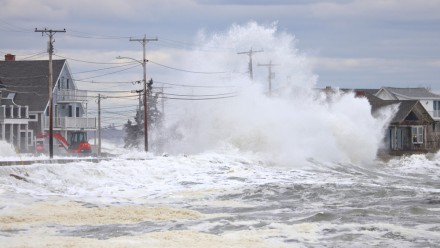The Global Value of Coastal Wetlands for Storm Protection
Climate change is aggravating the threat that many coastal communities face from tropical cyclones, due to rising sea levels and larger, more frequent storm events.
While some communities have opted to construct expensive seawalls in an attempt to keep the bad weather at bay, research led by Professor Robert Costanza has shown that coastal wetlands are both a successful and cost-effective method of preventing storm damages.
In what was the first global estimate of the value of coastal wetlands in avoiding storm damages, the research showed that coastal wetlands worldwide save over 4,600 lives and almost US$450 billion a year in storm damage costs.
“Coastal wetlands offer storm protection to coastal communities that is both cheaper and more environmentally friendly than other options, such as seawalls,” said Professor Costanza.
To make the calculation, the study used current storm probabilities and historical records of over 1,000 tropical cyclones across 71 countries since 1902, which recorded property damage and/or human casualties.
The mechanisms at play in making wetlands so effective at disaster prevention include; decreasing the area of open water for wind to form waves, increasing drag on water motion, directly absorbing wave energy, absorbing flood waters, and vegetation helping to decrease surges and maintain shallow water depths.
“Coastal wetlands lessen the damage caused by tropical cyclones on coastal communities by absorbing storm energy, in ways that are much more effective than solid land or open water,” said Professor Costanza.
According to Professor Costanza, coastal wetlands also provide a variety of other valuable ecosystem services that seawalls don’t.
“They provide habitat for marine species, sequester carbon, offer recreational opportunities, and manage sediment and nutrient run-off, among many others,” he said.
Up to 70 per cent of the world’s wetlands have been lost since 1900. Professor Costanza’s research substantiates calls for greater investment in conservation and restoration efforts.
“In a world facing increasing frequency and intensity of tropical cyclones due to climate change, they are the best line of defence to protect coastal communities,” he concluded.











